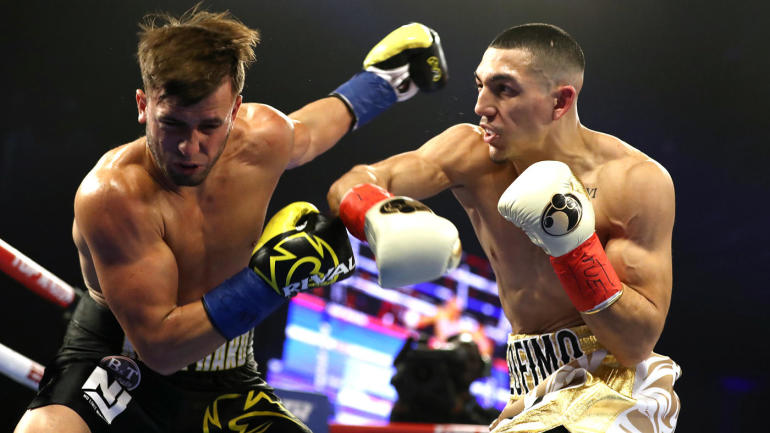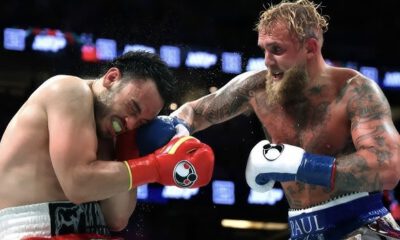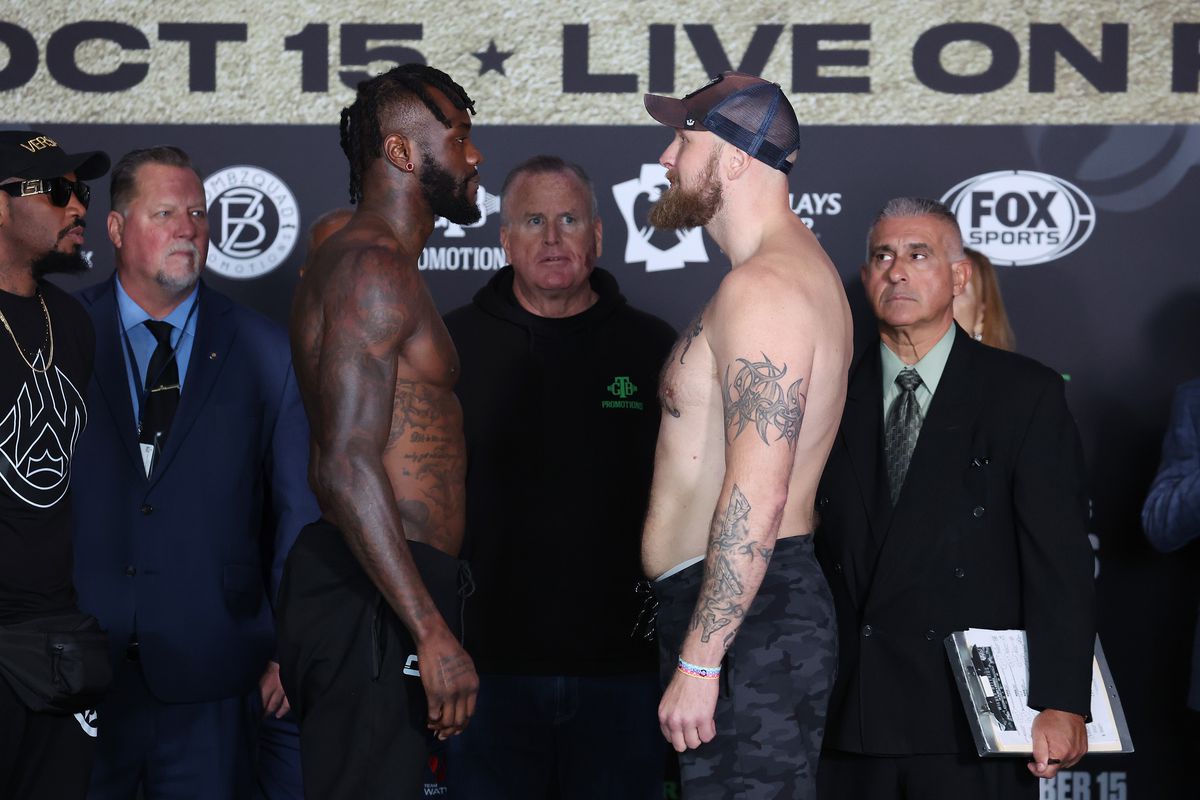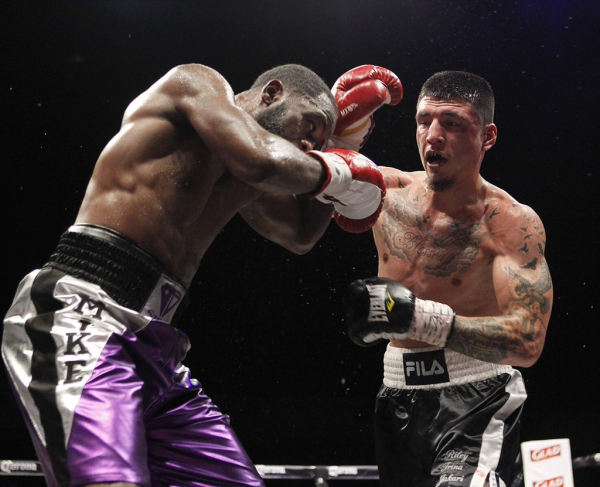
One of the more popular proposition bets in boxing is the Over/Under bet otherwise known as the Total round’s wager. Over/Under bets operate on the Moneyline system and often provide bettors with a more valuable option than a straight-up wager on who wins or loses the bout. The reason for this is that the majority of professional fights pit the promoter or TV “house” fighter against a sacrificial lamb brought in to lose.
For example, when 2018 prospect of the year Teofimo Lopez faced fringe contender Mason Menard the boxing odds had Lopez as a massive -2000 Moneyline favorite. While most experts expected Teofimo to win easily laying $2000 on the Moneyline to win a measly $100 provided little value in a sport where anything can happen on any given night.
Lopez was the future star with heavy financial backing from ESPN and the power brokers brought in the weak-chinned Menard to showcase their cash cow. With Over/Under set at 7.5 rounds at -200 Moneyline the sharps hammered the Under in anticipation of a Lopez blowout win. In just :44 seconds the heavy-handed Lopez starched Menard for an easy Under win for his backers.
It must be understood that Over/Under 7.5 rounds means that a fight must go Over 1:30 into the 7th round to cash in on the Over. If the Over/Under is 7.5 Rounds and the fight ends at 1:29 into the 7th round this would cash in an Under win. It must be noted that Over/Under bets range from 1.5 rounds to 11.5 rounds and also come attached with Moneylines. This means that fight Over/Under bets range from 1:30 of the 1st round (1.5) to 1:30 of the 12th round (11.5).
Most Moneylines open in the -110 to -150 range but can go as high as -800. For example, in the 1980’s heavyweight champion, Mike Tyson knocked out almost all of his opponents in the 1st round. Because of this, the oddsmakers would list the Over/Under at 1.5 rounds with the Under -150 expecting the bout to end in 1:30 or less of the 1st round.
On the opposite side of the spectrum, Floyd Mayweather’s fights were almost exclusively listed at 11.5 rounds with the Moneyline price tag as high as -800 on the Over. Prior to fighting Conor McGregor the brittle-handed Mayweather for all of his greatness had only had 1 fight go Under 11.5 rounds in his previous 11 fights. It should be noted that the one fight that Mayweather managed to go Under the 11.5 mark was when he sucker punched Victor Ortiz to score a cheap knockout win.
ESPN2 News Insider Tips on How to Bet the Over/Under in Boxing
-
Glove Size, Type, and Weight Class
Glove size and the type of glove manufacturer vary from fight to fight. Most boxing commissions adhere to Las Vegas boxing commission rules which state that any contracted fight under 150 Lbs. will use 8 oz. gloves and any fight over 150 Lbs. requires 10 oz. gloves.
While the difference in two ounces of padded leather might not seem like much the impact of a shot from an 8 oz. glove is more likely to produce a knockout than a 10 oz. glove, therefore, making the Under an attractive bet. It should be noted that not all commissions require this rule and some commissions in small boxing markets bend rules like these quite frequently.
-
Heavier weight classes often produce more Under wins
This factor is a matter of physics with heavier fighters more likely to produce a knockout with a single punch. The average heavyweight weighs about 230 Lbs. and with a 10 oz. gloved fist a hard-punching heavyweight can produce punching force that rivals the amount of pressure created by a trash compactor.
When legendary 1950s heavyweight Rocky Marciano knocked out Jersey Joe Walcott with a single overhand right the punch was estimated by neurologists to have destroyed 30,000+ brain cells. Marciano weighed only 184 Lbs. against Walcott and was still able to produce this amount of power with a single bomb. The Under bet in heavyweight fights are usually attractive bets.
-
Boxer’s motivation and will to win
Boxing is a deadly sport and some pugilists are simply in the ring to pick up a paycheck. For example, the invincible Mike Tyson was defeated as a -4200 Moneyline favorite by a motivated Buster Douglas after his mother passed away two weeks prior to the bout with Tyson. The Over/Under on Tyson vs Douglas was listed at 2.5 rounds and ended with Douglas winning via 10th-round knockout.
An emotional factor like this can create out-of-body performances in almost any sport just like when Hall-Of Fame quarterback Brett Favre turned in arguably the best performance of his life when his father passed days before a Monday Night Football game. Tyson stated in his autobiography that he hadn’t trained for the Douglas fight for months and was fighting for easy paychecks.
Older fighters are also more likely to quit on their stool when self-preservation kicks in after taking brain-rattling shots that make health a priority over pride. Boxer quotes from a grizzled veteran before a match should be taken into consideration. If a boxer mentions prior to a fight that he is contemplating retirement he is more likely to quit in the early rounds. The Under is an attractive bet in these types of situations.
-
Boxers cut vulnerability and punch resistance
Some fighters are equipped with leather tough mugs that can be hit with a baseball bat without leaking any blood. Other boxers cut very easily due to excessive scar tissue or thin facial skin. A fighter’s ability to take a shot to the head is the most important factor in their level of durability with 90% of punches generally directed at the skull. An inspection of a fighter’s record can usually reveal how many times the fighter has been knocked down, knocked out, or stopped on cuts.
While punching to the body is a lost art in modern boxing some boxers can rip visceral body punches that can stop a boxer vulnerable to body shots. Physical frame and natural weight classes are crucial factors in predicting how well a fighter will absorb a body punch.
Hall-Of-Famer Oscar De La Hoya was a natural 147 Lb. fighter but when the naturally smaller De La Hoya stepped up to 160 Lbs. to face champion Bernard Hopkins he was stopped with a single body shot to the liver. Hopkins was not considered a big puncher but De La Hoya’s smallish frame could not handle the punch and he was knocked out for the first time in his career by a body punch.
-
Boxers that are rich
The mega fight between Floyd Mayweather vs Manny Pacquiao is a perfect example of what happens when two rich guys fight with a guaranteed Powerball payday provided they show up. Boxers are guaranteed to cash their paychecks win or lose before the bout unless they produce a total non-effort. If a boxer quits inexplicably or doesn’t fight back the boxing commission can withhold a fighter’s paycheck but these occasions are few and far between.
Mayweather was guaranteed $220+ million in his bout with Pacquiao who was guaranteed $180+ million to dance with Mayweather for a few rounds. The fight itself was a glorified sparring match with both fighters showing little aggression and extreme caution. Most top-level boxers are skilled enough to last the distance if they decide they would rather survive than win. Fights of this nature often go the distance and are attractive Over bets.
Related posts:
No related posts.











